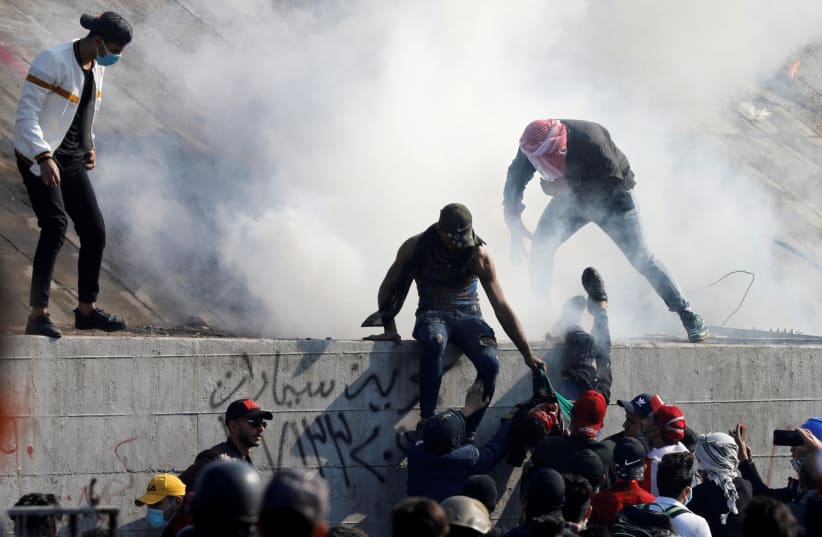The new push to end the sit-ins and restore order came hours after populist cleric Moqtada al-Sadr, who counts millions of supporters in Baghdad and the south, said he would halt his involvement in anti-government unrest.
Sadr's supporters, who had bolstered the anti-government protesters and sometimes played a role in protecting them from attacks by security forces and unidentified gunmen, began withdrawing from sit-ins early on Saturday after Sadr's announcement.
Clashes then took place after authorities began removing concrete barriers near Tahrir Square where anti-government demonstrators have camped out for months, and across at least one main bridge over the Tigris River in the capital, Reuters reporters said.
Supporters of al-Sadr had begun to leave protest camps overnight after he announced he would no longer be involved in the anti-government demonstrations.
In the southern city of Basra, security forces raided the main anti-government sit-in overnight and deployed in force to stop protesters gathering there again, security sources said. Police arrested at least 16 protesters in the city, they said.
In Baghdad, at least one person was killed and more than 30 injured in clashes between police and protesters near Tahrir Square.Another three died and 14 were wounded in the southern city of Nassiriya when security forces took control of a bridge occupied for days by demonstrators, security sources and medics said.
Iraq's security forces have used tear gas and live ammunition against mostly peaceful protesters since anti-government unrest broke out in Baghdad on Oct. 1. More than 450 people have died in the violence, according to a Reuters tally from police and medics.
MONTHS OF DEMONSTRATIONS
The demonstrators demand the removal of what they see as a corrupt Iraqi ruling elite and the end of interference in politics by foreign powers, especially Iran which has come to dominate state institutions since the toppling of Saddam Hussein in a 2003 U.S.-led invasion.
The actions of the security forces appeared to be an attempt to fully clear anti-government sit-ins and end months of demonstrations calling for the removal of Iraq's ruling elite.
The raids began hours after al-Sadr said he would halt the involvement of his supporters in the anti-government unrest.
Sadr had supported the demands of protesters for the removal of corrupt politicians and for the provision of services and jobs soon after the demonstrations began in October, but stopped short of calling all his followers to join in.
Many of Sadr's millions of supporters, often hailing from Baghdad's slums, have however been involved in the protests.
Sadr's followers, in a rally on Friday separate from the anti-government protests, called for the removal of U.S. troops from the country. The march dissipated after several hours.
Sadr wrote on Twitter late on Friday he would "try not to interfere in the issue (of protesters), either negatively or positively, so that they can shepherd the fate of Iraq." He did not elaborate.
In Basra, protesters urged Sadr to reconsider what they said was a withdrawal of support for popular demonstrations. In a letter circulated on social media, they called for the support of Sadrists, without which they feared attacks by security forces.
